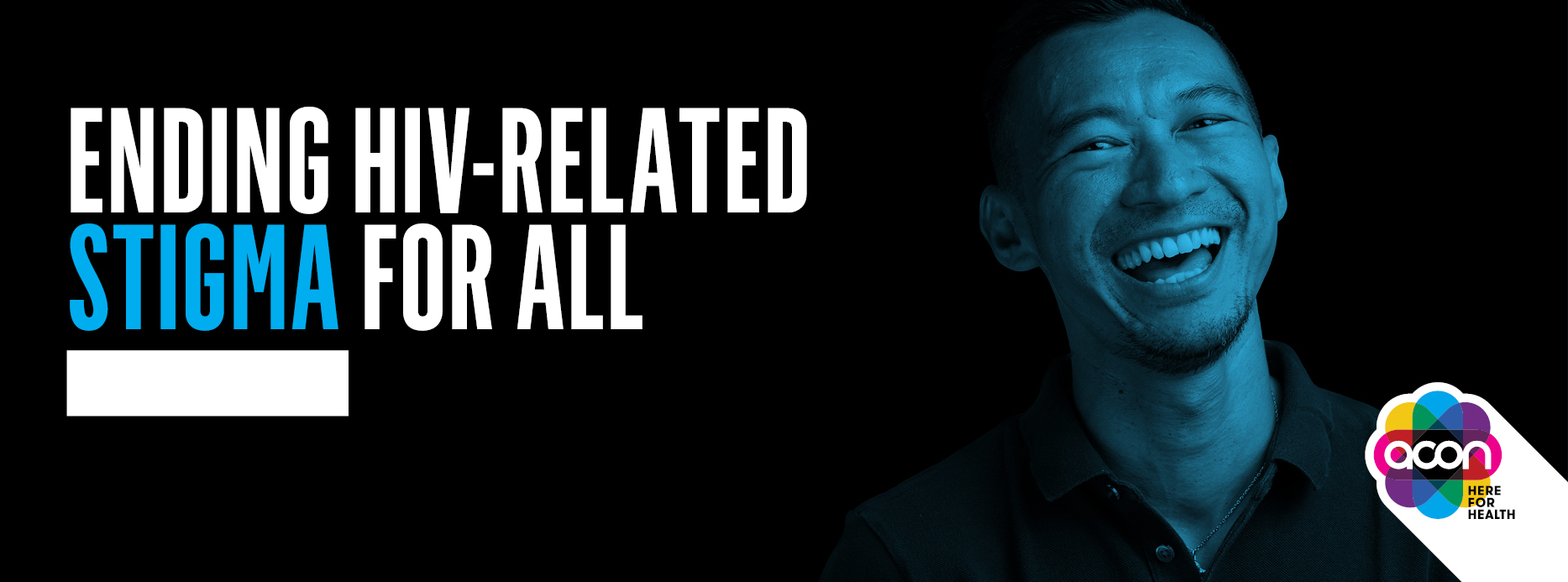On the eve of Worlds AIDS Day (1 December) HIV advocates are calling for greater efforts and coordination in eliminating HIV-related stigma which, if left unchallenged, can have significant negative implications on Australia’s world-leading HIV prevention efforts.
A new discussion paper released today by ACON, NSW’s leading HIV and sexuality and gender diverse health organisation, lays bare the impact of stigma on people living with HIV (PLHIV), as well as on public health more broadly. Titled Ending HIV-Related Stigma For All, it found that HIV stigma lead to poorer health outcomes for PLHIV.
It also acts as a barrier to testing and service access for priority populations, including for migrant gay and bisexual men who now account for most new HIV notifications in NSW. As such, stigma hinders efforts to end HIV transmissions.
The paper outlines a series of recommendations that calls for a coordinated, multi-pronged approach to eliminate HIV stigma.
ACON CEO Nicolas Parkhill said HIV-related stigma can have a debilitating effect on the lives of people living with HIV.
“HIV-related stigma has real consequences on the health-related quality of life of people living with HIV,” Parkhill said. “Stigma leads to poorer physical and mental health outcomes. It is a barrier to accessing healthcare and may contribute to incomplete disclosure about health status and medications by patients.”
The paper found that HIV-related stigma is often compounded with prejudices based on sexuality, gender, race, drug use, sex work and other diseases such as hepatitis C.
Parkhill said that HIV-related stigma hinders efforts to end HIV transmissions for all in NSW.
“HIV-related stigma hinders efforts to end HIV transmissions for all in NSW,” Parkhill said. “It acts as a barrier for HIV testing, immediate treatment initiation and adherence. Undiagnosed HIV, or late diagnoses, are persistent, and present high risks for the individual and the community as onward transmissions may continue.”
The paper explores key interventions to tackling HIV stigma. Parkhill said we must adopt a combination approach if we are to eliminate HIV-related stigma at an individual, community and structural level.
“These interventions include mobilising people living with HIV to challenge stigma, implementing programs that improve HIV literary and promote positive representations; and having a legal environment that is informed by public health evidence.”
Parkhill highlighted proposed legislation that enforces mandatory testing on people whose bodily fluids come into contact with emergency services personnel as a key example of policy frameworks that perpetuate HIV-related stigma.
“Mandatory testing is not based on any evidence of occupational transmission of disease. Putting in place legislation that has no evidence base and relies on outdated and stigmatising notions of disease transmission risk, is alarming and retrograde.
“Advances in prevention and treatment of HIV mean that police and other frontline professionals have access to treatments that prevent the transmission of the virus, and these treatments are prescribed by doctors who are trained in identifying potential risk.
“Punitive laws based on outdated and debunked myths about how HIV and other BBVs are transmitted, and that perpetuate stigma, prejudice and discrimination, do not need to be introduced at a time when so much progress has been made in ending HIV in NSW. This move runs the risk of derailing NSW’s world-leading HIV response.
“We urge the NSW parliamentarians to reconsider the introduction of mandatory testing laws or, at the very least, put in place a model that allows for greater medical oversight and input.”
The Ending HIV-related Stigma For All paper will be launched at an online panel event on the eve of World AIDS Day. The digital forum, featuring a range of community advocate and health experts, will explore the impact of HIV stigma on the daily lives of people living with HIV and on public health.
Parkhill added: “As well as a time to remember those we have lost to an AIDS-related illness, World AIDS Day provides us with an opportunity to galvanise our communities to continue the fight against HIV. Eliminating HIV stigma is crucial in that endeavour and we invite everyone to join us in this journey. HIV-related stigma ultimately affects us all, and in order to end HIV transmissions for everyone, we must eradicate stigma.”
“With this paper and panel, we want to kick-start this conversation and explore what changes need to be made, and what issues need to be addressed, to ensure people living with HIV are able to live their healthiest and fullest lives.
“It is also a call to action: our communities in NSW have come so far and made significant strides in reducing HIV transmission, but to keep up the momentum, we must ensure all in our communities are free from stigma, prejudice and hate.”
Read the Ending HIV-Related Stigma For All paper here.
ENDS
David Alexander, ACON Media and Communications
E: dalexander@acon.org.au T: (02) 9206 2044 M: 0428 477 042
